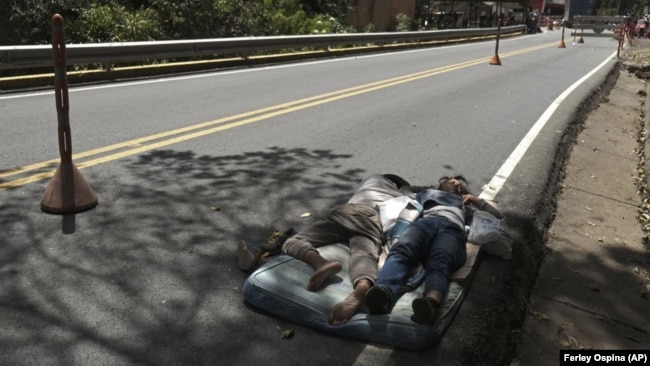ベネズエラの今
世界の今を知ろう!! 週間!!第5弾
今回は、ベネズエラ。知っているようで知らない国。
早速VOAニュースより。何が起きているのでしょう???
心が痛む現状です。
家がる、家族がいる、当たり前に思っていることが実はなんと恵まれていることなのでしょうか。
- ベネズエラの人々は、トラブルの増加に伴い、再び逃亡している
- ベネズエラってどこ? (ベネズエラ・ボリバル共和国)
- ベネズエラ・ボリバル共和国ってどんな国?
- Venezuelans Once Again Fleeing as Troubles Increase
ベネズエラの人々は、トラブルの増加に伴い、再び逃亡している
Venezuelans Once Again Fleeing as Troubles Increase
October 16, 2020
エレアザール・エルナンデスさんは、寒くなってきた小雨の中、道端で寝ていました。
この23歳のベネズエラ人は妻と一緒にコロンビアの街メデジンに向かおうとしていたのです。妻は妊娠7ヶ月。
彼らはメデジンから約480キロ離れたパンプローナの小さな町に行くまでの交通費を持っていませんでした。ヘルナンデスさんはトラックの荷台に乗って、パラモ・デ・ベルリン(Paramo de Berlin)という山間部を越えようとしていたのです。
「妻は歩くのがやっとなんだ。ここから出るには移動手段が必要だよ」と彼は言いました。AP通信によると、2人はパンプローナの歩道で4日間寝泊まりしていたといいます。
ベネズエラの人々は、自国の経済的・人道的災害から再び逃れているのです。
病気COVID-19とその拡散を遅らせるための措置は、世界最大の移民移動の1つを停止しました。ベネズエラの人々は、多くの人々が月に2ドル以下の収入しか得られない経済から逃れるためにコロンビアに向かっているのです。
出て行く人の数は以前よりも少なくなっています。しかし、コロンビアの移民当局は、今後数ヶ月の間に20万人のベネズエラ人が入国すると予想しています。コロンビアでは、彼らが仕事を見つけるチャンスがあり、家族を養うためにお金を送り返すことを可能にします。
新しい移民たちは、COVID-19の前にベネズエラから逃げてきた人たちよりも劣悪な状況に置かれています。多くの避難所は閉鎖されたままです。感染を恐れているコロンビア人は、食料の寄付を手伝うことは少ないのです。運転手がヒッチハイカーを拾うことも少なくなっています。
「私たちは途中でほとんど手助けを得ることができませんでした」とアナヒール・モンティリャさんは言います。彼女はグァリコのベネズエラの州で料理人をしています 。モンティリャさんは、27日間家族と一緒に旅をした後、コロンビアの首都ボゴタ近くに来たのだ、とAP紙に話しました。
COVID-19のパンデミックの前に、500万人以上のベネズエラ人が彼らの国を去った、と国連は指摘しています。最も貧しい人々はただ歩いているだけでした。
南米各地の政府がCOVID-19の蔓延を食い止めようと行動を起こしたため、多くの移民が仕事を失ったのです。10万人以上のベネズエラ人は、少なくとも家族と一緒に暮らせる自国に戻りました。
現在も、両国間の公式の陸路と橋の踏切は閉鎖されています。移民たちは、麻薬密売人や民族解放軍のような反政府組織によって道路が管理されている場所で、不法に国境を越えることを余儀なくされています。
「ベネズエラの移民の帰還は、国境が閉鎖されているにもかかわらず、すでに起こっています」と、アナ・ミレーナ・ゲレロ氏は言います。彼女は国際救助委員会(International Rescue Committee)の職員で、移民を支援する人道的非営利団体です。
多くのベネズエラ人は現在、燃料不足のため、国境に到達するために何日も自国内を歩くことを余儀なくされています。
ヘルナンデスさんは、故郷のベネズエラのロス・テケスからコロンビアまで歩くのに7日かかったといいます。
「娘がお腹を空かせて寝なければならないような場所で生まれるのは許せません。」と彼は言います。
移民がコロンビアに到着すると、彼らは新たな問題に直面します。コロンビアの失業率は3月の12%から8月には16%近くまで上昇したのです。賃貸住宅への支払いが出来ない人々は、家から押い出されています。コロンビアに住むベネズエラ人の50%以上が不法滞在しており、法的保護を受けていません。
ベネズエラってどこ? (ベネズエラ・ボリバル共和国)

ncm-center,co,jp
ベネズエラ・ボリバル共和国ってどんな国?
Venezuelans Once Again Fleeing as Troubles Increase
 Venezuelan migrants sleep on a mattress on the side of the highway in Pamplona, Colombia, Wednesday, Oct. 7, 2020,(AP Photo/Ferley Ospina)Venezuelans Once Again Fleeing as Troubles Increase
Venezuelan migrants sleep on a mattress on the side of the highway in Pamplona, Colombia, Wednesday, Oct. 7, 2020,(AP Photo/Ferley Ospina)Venezuelans Once Again Fleeing as Troubles Increase
Eleazar Hernández slept on the side of a road in the light rain as the weather turned cold.
The 23-year-old Venezuelan was trying to get to the Colombian city of Medellin with his wife. She is seven months pregnant.
They had no money for transportation by the time they reached the small town of Pamplona, about 480 kilometers away from Medellin. Hernández hoped to get a ride on the back of a truck to cross the Paramo de Berlin, an area high in the mountains.
“My wife can barely walk,” said Hernández. “We need transport to get us out of here,” he added. The Associated Press (AP) reports the two spent four days sleeping on Pamplona’s sidewalks.
Venezuelans are again fleeing their nation’s economic and humanitarian disaster.
The disease COVID-19 and measures to slow its spread halted one of the world’s biggest migrationmovements. Venezuelans are going to Colombia to escape an economy where many people earn less than two dollars a month.
The number of people leaving is smaller than before. But Colombian immigration officials expect 200,000 Venezuelans to enter the country in the next few months. In Colombia, there is the chance for them to find work, which will allow them to send money back to feed their families.
The new migrants are finding conditions worse than those who fled Venezuela before COVID-19. Many shelters remain closed. Colombians fearing infection are less likely to help with food donations. And drivers are less likely to pick up hitchhikers.
“We hardly got any lifts along the way,” said Anahir Montilla. She is a cook from the Venezuelan state of Guarico. Montilla spoke with The AP as she was nearing Bogota, Colombia’s capital, after traveling with her family for 27 days.
Before the COVID-19 pandemic, over 5 million Venezuelans had left their country, notes the United Nations. The poorest simply walked.
As governments across South America took action in hopes of stopping the spread of COVID-19, many migrants found themselves without work. Over 100,000 Venezuelans returned to their country, where at least they could live with family members.
Today, official land and bridge crossings between the two countries are still closed. Migrants are forced to cross the border illegally, where the roads are controlled by drug traffickers and rebel organizations like the National Liberation Army.
“The return of Venezuelan migrants is already happening even though the border is closed,” said Ana Milena Guerrero. She is an official for the International Rescue Committee, a humanitarian non-profit organization helping migrants.
Many Venezuelans are now forced to walk within their own country for days to reach the border because of fuel shortages.
Hernández said it took him seven days to walk from his hometown of Los Teques, Venezuela, to Colombia.
“I can’t allow my daughter to be born in a place where she might have to go to bed hungry,” he said.
Once the migrants arrive in Colombia, they face new problems. Colombia’s rate of unemployment rose from 12 percent in March to almost 16 percent in August. Those who cannot pay for rental housing are being pushed out of their homes. More than 50 percent of all Venezuelans in Colombia are living there illegally and have no legal protection.
________________________________________________________________
Words in This Story
migration - n. the movement of people from one area to another
allow - v. to let or to make an opportunity to do something
hitchhiker - n. one who stands on the side of the road asking for a ride
pandemic - n. a contagious disease that moves around the world
rental - adj. not owned but paid for monthly or weekly like an apartment or car
